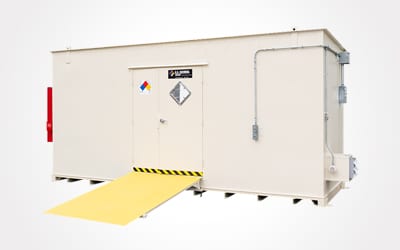How to Safely Store Bulk Ethanol and Other Chemicals Used in Making Hand Sanitizer

 As the novel coronavirus (COVID-19) outbreak spreads across the country, it seems no one has been immune to its effects. The outbreak has bred panic and can best be showcased by the extreme hoarding of common household items such as toilet paper, Clorox wipes and hand sanitizer, and hand sanitizer ingredients. COVID-19 has shuttered businesses, schools, and mass gatherings – everything from rural churches to multi-billion-dollar generating sports tournaments. Since its inception, this virus has created a new normal for how we work, shop, learn, and interact with one another.
While the situation may look dreary, the novel coronavirus has also created opportunities for some businesses to help in often unique ways. Historically, in times of war or global emergencies, manufacturers have retooled their production lines to meet supply and demand of products to support the greater cause. They pivoted not only to support the needs of the time, or continued business growth, but also to protect their most valuable assets – their employees.
In the case of COVID-19, the increasing shortages of hand sanitizers represents an ongoing problem. It’s a product that is simply not available for everyone who needs it. The household brand names we all know, such as Purell, can’t keep up with the demand. In many areas, the supply is so scarce that the FDA has begun recommending healthcare workers to make their own if unable to find any. The FDA, in doing its part, also released guidance documents for the temporary manufacturer of some alcohol-based hand sanitizers, effective immediately and through the duration of the coronavirus pandemic, to help businesses with secure supply lines pivot their production.
As the novel coronavirus (COVID-19) outbreak spreads across the country, it seems no one has been immune to its effects. The outbreak has bred panic and can best be showcased by the extreme hoarding of common household items such as toilet paper, Clorox wipes and hand sanitizer, and hand sanitizer ingredients. COVID-19 has shuttered businesses, schools, and mass gatherings – everything from rural churches to multi-billion-dollar generating sports tournaments. Since its inception, this virus has created a new normal for how we work, shop, learn, and interact with one another.
While the situation may look dreary, the novel coronavirus has also created opportunities for some businesses to help in often unique ways. Historically, in times of war or global emergencies, manufacturers have retooled their production lines to meet supply and demand of products to support the greater cause. They pivoted not only to support the needs of the time, or continued business growth, but also to protect their most valuable assets – their employees.
In the case of COVID-19, the increasing shortages of hand sanitizers represents an ongoing problem. It’s a product that is simply not available for everyone who needs it. The household brand names we all know, such as Purell, can’t keep up with the demand. In many areas, the supply is so scarce that the FDA has begun recommending healthcare workers to make their own if unable to find any. The FDA, in doing its part, also released guidance documents for the temporary manufacturer of some alcohol-based hand sanitizers, effective immediately and through the duration of the coronavirus pandemic, to help businesses with secure supply lines pivot their production.
What Type of Industries/Companies Can Easily Convert Operations to Produce Hand Sanitizer?
According to the U.S. Centers for Disease Control and Prevention, hand sanitizers with at least 60% alcohol content are most effective for limiting the spread of the novel coronavirus. Certain types of companies may find it easier to convert their production lines to hand sanitizer, especially if they can procure from already-established supply chains or if they have an inventory surplus. For instance, many alcohol distilleries and breweries across the country easily switched to bottling sanitizer over spirits. Some cosmetic/skin care and perfume factories were quickly converted as well. Other industries making the switch include food processing facilities, manufacturers of cannabis, and e-cigarette manufacturers. Even Ikea, the world’s largest furniture manufacturer, has tweaked its business model and is producing medical relief products. Ikea’s about face includes hand sanitizers to be donated to medical facilities as needed around Europe.The Main Ingredient in Hand Sanitizer: Alcohol
While the increased production of hand sanitizers will greatly help healthcare workers in the field, safe bulk chemical storage must be considered by the new manufacturers of these products. Depending on the type of manufacturer, the FDA guidance has specified hand sanitizer must be compounded using either ethanol alcohol of no less than 94.9% ethanol by volume, or United States Pharmacopeia (USP grade) isopropyl alcohol. Ethanol alcohol and isopropyl alcohol are very similar when it comes to disinfectant properties. Ethanol is commonly found in alcoholic drinks; another name for rubbing alcohol, isopropyl alcohol is often used as an antiseptic. Both ethanol and isopropyl alcohol are extremely flammable, with flashpoints below 100°F. With vapor denser than air, they are considered a Class IB flammable liquid. Their quick evaporation rate allows fumes to build up, becoming especially dangerous when storing large quantities which is why the proper storage of bulk ethanol and isopropyl chemical storage is key to a safe operation.Safe Bulk Chemical Storage Solutions for Hand Sanitizer Ingredients
Because they are so flammable; U.S. Chemical Storage recommends storing bulk alcohol supplies for hand sanitizer in prefabricated, fire-rated chemical storage buildings. Our storage solutions help reduce the risk of an explosion due to fire or a buildup of vapors by utilizing mechanical ventilation or exhaust fans. If proximity to the chemicals is a production requirement, our 4-hour fire rated buildings provide an advantage. They can be used when storing 10-feet or less from an occupied building. Use 2-hour fire rated buildings when storing hand sanitizer ingredients anywhere from 10 to 30-feet away. Additionally, all U.S. Chemical Storage buildings can be customized to fit your operations specific needs. According to flammables storage guidelines, isopropyl and ethanol alcohol should be stored in cool, well-ventilated spaces, away from sunlight. At U.S. Chemical Storage, we offer climate control systems to ensure a safe, consistent temperature within the storage building. Our team can also add a fire suppression system as a Plan B, in case a fire does occur and you’re able to choose from water sprinkler or automatic dry chemical fire suppression systems.Contact U.S. Chemical Storage Today
When storing chemicals, it’s important to use the safest and most dependable chemical storage buildings there are. U.S. Chemical Storage offers many different options of lockers, buildings, and accessories to fit your needs. Our experienced engineers work with you throughout the process, from design to delivery and help ensure the safety and integrity of our products while working to minimize costs to you. Contact us today for a free quote.Configure Your Storage Building

